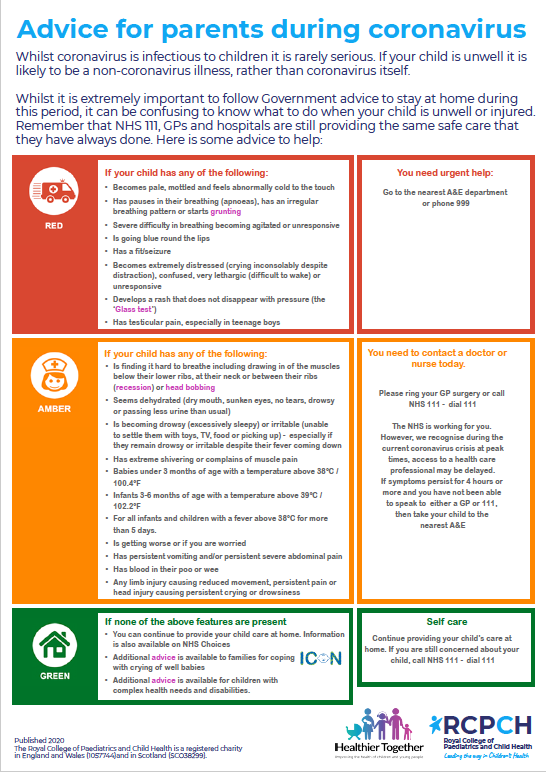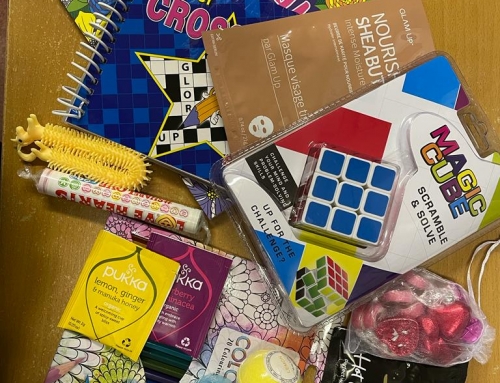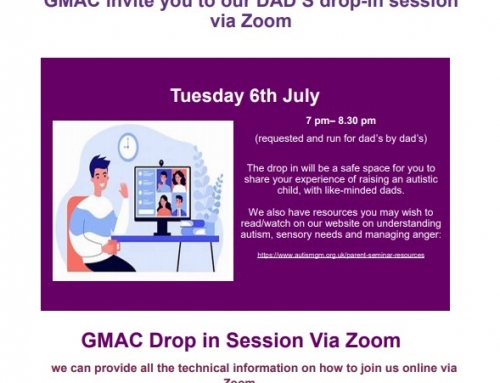Manchester City Council recently reached out to us to say that Health colleagues have raised concerns that families are presenting children late with serious conditions/ Covid-19 because of anxieties about attending hospitals.
They shared with us the following guidance from Healthier Together and the Royal College of Paediatrics and Child Health (RCPCH), which lists some features to watch out for when your child is unwell. They categorised these features as red (urgent help needed), amber (contact a doctor or nurse today) and green (self care from home).
Please see below a message from Healthier Together:
What parents need to know about COVID-19
COVID-19 appears to generally cause mild illness in children. Less than 2 in every 100 cases diagnosed in China have been in children and infection appears to be milder in children than it is in adults, although we do not yet understand exactly why this is the case.
However, at this time, when everyone is preoccupied with COVID-19, it’s really important to realise that not every illness your child has is due to COVID-19. All the ‘normal’ infections that can make children and babies really unwell still remain and there is a major risk that parents may delay bringing their child to the attention of a healthcare professionals even if they are unwell. If you are not sure if your child is unwell and whether they need to be seen by someone, click here to help you decide. GPs and hospitals are still providing the same safe care that they always do for children.
- Becomes pale, mottled and feels abnormally cold to the touch
- Has pauses in their breathing (apnoeas), has an irregular breathing pattern or starts grunting
- Severe difficulty in breathing becoming agitated or unresponsive
- Is going blue round the lips
- Has a fit/seizure
- Becomes extremely distressed (crying inconsolably despite distraction), confused, very lethargic (difficult to wake) or unresponsive
- Develops a rash that does not disappear with pressure (the ‘Glass test’)
- Has testicular pain, especially in teenage boys
One or more of the above symptoms means that your child needs urgent help:
Go to the nearest A&E department or phone 999.
- Is finding it hard to breathe including drawing in of the muscles below their lower ribs, at their neck or between their ribs (recession) or head bobbing
- Seems dehydrated (dry mouth, sunken eyes, no tears, drowsy or passing less urine than usual)
- Is becoming drowsy (excessively sleepy) or irritable (unable to settle them with toys, TV, food or picking up) – especially if they remain drowsy or irritable despite their fever coming down
- Has extreme shivering or complains of muscle pain
- Babies under 3 months of age with a temperature above 38°C / 100.4°F
- Infants 3-6 months of age with a temperature above 39°C / 102.2°F
- For all infants and children with a fever above 38°C for more than 5 days.
- Is getting worse or if you are worried
- Has persistent vomiting and/or persistent severe abdominal pain
- Has blood in their poo or wee
- Any limb injury causing reduced movement, persistent pain or head injury causing persistent crying or drowsiness
One or more of the above symptoms means you need to contact a doctor or nurse today.
Please ring your GP surgery or call NHS 111
It worth noting that, during the current coronavirus crisis at peak times, access to a health care professional may be delayed. The NHS advises that “if symptoms persist for 4 hours or more and you have not been able to speak to either a GP or 111, then take your child to the nearest A&E.”
- You can continue to provide your child care at home. Information is also available on NHS Choices
- Additional advice is available to families for coping with crying of well babies: Visit ICON for details.
- Additional advice is available for children with complex health needs and disabilities: Visit WellChild for details.
Self care is advised:
Continue providing your child’s care at home. If you are still concerned about your child, call NHS 111.
Here’s a copy of the full poster. You can also visit Healthier Together’s Covid-19 page for more information.







Leave A Comment